The ten best PC game intros
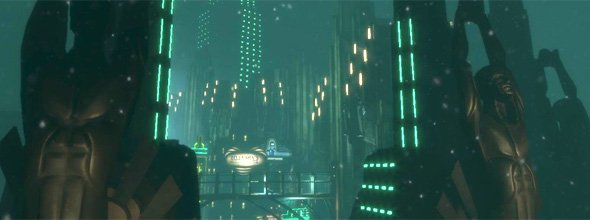
We lead busy lives. We humans can no longer be expected to trawl through endless exposition, reams of scene-setting text, hours of tedious tutorials. No, sirry: we demand instant excitement. If the intro's no cop, it ain't worth playing. So here's a roundup of the best intros in the history of PC gaming - choose these, and you'll make sure you won't end up asleep at the keyboard before the first big 'splode.
Unreal
What happens: You awake on a crashed prison ship. Exploring, you notice something moving up ahead. You follow it through the corridors, readying yourself for a fight against whatever this alien thing might be, before eventually escaping the ship.
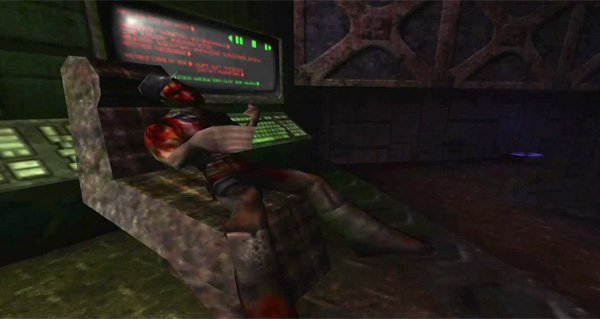
Why it's awesome: The fight never comes, even though it's always hinted at. You're expecting your alien foe to strike at any moment as you stalk it around the crashed prison. It keeps showing itself for a brief second before disappearing again. And at one gruesome point, you hear a fellow prisoner being ripped to shreds on the other side of a door. But actually, all it's doing is leading you on a natural path to the outside world - and back in 1998, the view you were presented with upon escaping was spectacular.
BioShock
What happens: You're on a plane. It crashes. You survive, but everything is on fire. Conveniently, there's a lighthouse sticking up from the ocean, with nothing else around. You enter, and find yourself in a bathysphere, descending for fathoms below the water's surface, listening to the voice of one Andrew Ryan talking about his political and social ideologies, and then bam - the screen lifts, and you catch your first glimpse of the remarkable underwater world of Rapture.
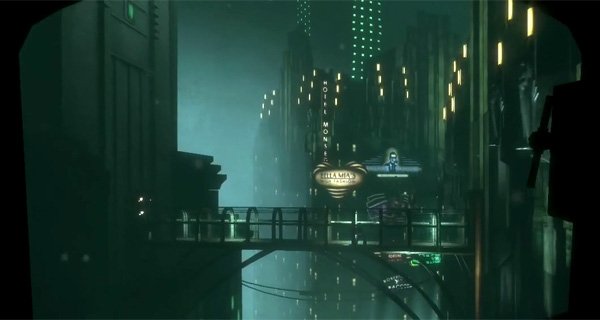
Why it's awesome: It's all in the timing of the reveal. The build up has been perfect - the plane crash genuinely startling, the slow swim to the water's surface suffocating. And then, having listened to this strange man talk about sweat and brows for a while, the curtains drop on this spectacular city just as he speaks its name. " Rapture ," he roars, just as the city appears in front of your very eyes.
Fallout 3
What happens: You're born. And then, over the next half hour or so, you play through a montage of your whole childhood, seamlessly defining your character along the way. Now that 's roleplaying.
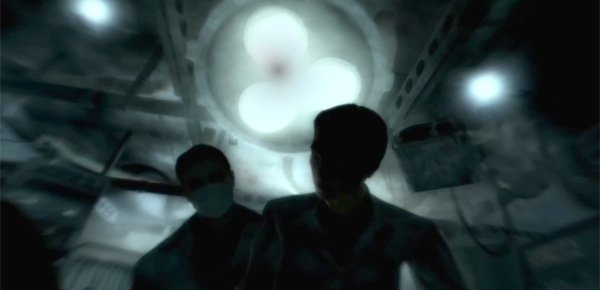
Why it's awesome: It just makes perfect sense. Every roleplaying game - of the traditional ilk, at least - starts with some form of character generation. So why not weave that into the narrative? Some of it's a little tenuous - the fact that a baby gets to choose its own name, for example - but much of it is very smart, and allows you to understand some of the fiction's history without a big hulk of sloppy exposition. Besides, there are few things as wonderful as crawling around as a little tot while inside a post-apocalyptic bunker.
Keep up to date with the most important stories and the best deals, as picked by the PC Gamer team.
Pathologic
What happens: After a truckload of scrolling text which makes barely any sense, you're dropped unceremoniously into a theatre. Onstage stand three "actors": the game's three playable characters. They argue about who is best suited to the job, then when you're ready, you walk through a door to the right and select which one of them you want to play as.
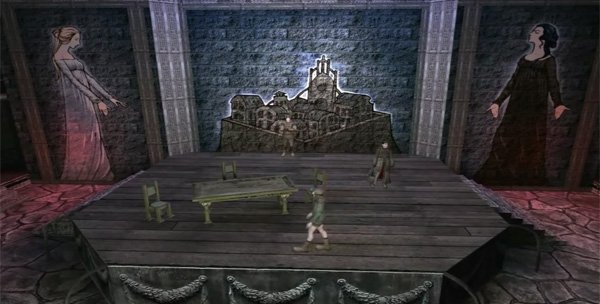
Why it's awesome: Talk about setting the tone. Pathologic never did stray away from the meta-commentary, but this staggering display of theatrical detachment as about as big a mission statement as they come. Here's a game that straight-up acknowledges that its world, its characters and its narrative aren't real: the point, then, becomes the layered metaphors and interesting ideas that Pathologic plays with throughout its uncomfortable and bleak duration.
Deus Ex
What happens: There's a nice intro cinematic, then you're thrown into your first mission. It begins on the docks of Liberty Island. There's a robot stomping around. You meet your brother, who presents you with an interesting choice.
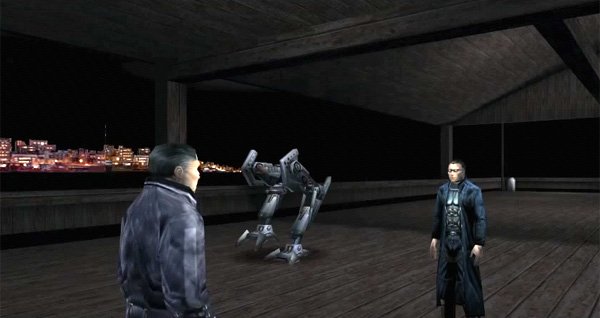
Why it's awesome: Two reasons: the choice, and the robot. The choice is of which weapon to take from your brother - a sniper rifle, a nonlethal minicrossbow, or a giant bloody rocket launcher. It's a statement of Deus Ex 's willingness to allow you to make broad choices at every turn, and whichever weapon you choose can drastically alter your experience of the opening level. And the robot is just wonderful. It's just there, happily plodding about, not referenced by either character. It's a glorious piece of incidental imagery that completely cements the feel of this day-after-tomorrow universe, without a single drop of exposition required.
Dragon Age: Origins
What happens: Depending on your chosen character, Dragon Age could begin in one of six different ways. And we're not talking slightly different opening cutscenes, either: there's a drastically different hour-or-so to be played through depending on your decision.
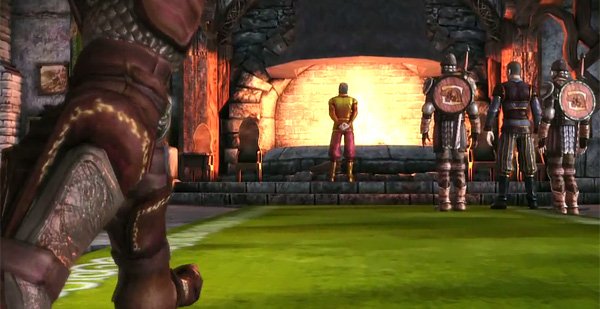
Why it's awesome: So many games proudly boast multiple endings. In reality, they're rarely more than a quick cutscene switch-around based on an arbitrary moral choice a few minutes earlier. But in Dragon Age , you get to live through your entire history. It makes your position in this world feel so much more credible having lived through it - but what's most remarkable is how the different origin sections contain unique sides to the story, causing you to sympathise with different characters based on your own character choice. A very smart touch.
Fahrenheit (aka. Indigo Prophecy)
What happens: You're sitting on the toilet. A classic intro. But wait! There's more. A gentleman's washing his hands. And you've got a knife. And all you can do is watch as your character wanders over and stabs the poor fellow 'til he's dead. Then the game starts, and it's your job to escape without anyone suspecting a thing.
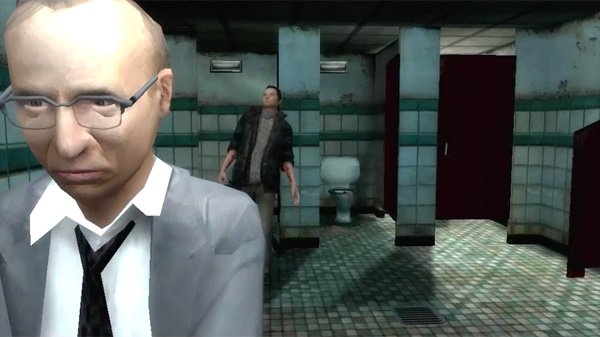
Why it's awesome: More games should throw you straight in the deep end. Fahrenheit 's opening sequence and the ensuing puzzle are brilliant for this. But moreover, it's a snapshot of exactly the sort of puzzle the game should have stuck with all the way through: a frightening, panicky situation with several possible resolutions. Unfortunately, Fahrenheit decided to forget the intricacy of its opening, and went plain batshit mental by the halfway point.
Braid
What happens: The intro screen launches. And then nothing happens. It's frozen. Oh, what a great start. You have to just- hang on... you can move! It's not an intro screen at all - you're in-game!
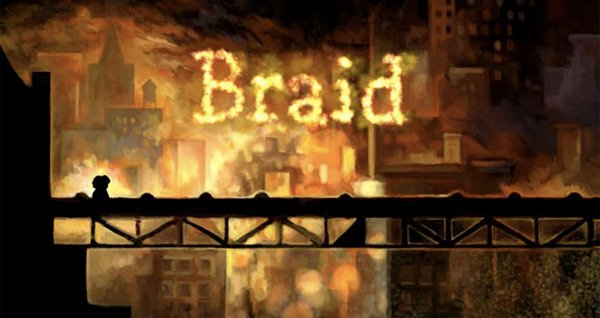
Why it's awesome: Something of an anomaly on this list, Braid 's introduction is memorable simply for how unexpectedly stylish it is. It strips away all the unnecessary faff and drops you straight into the first section of the game in a sort of interactive menu. You wander to the right, into a house, and select your level from there - nothing's extraneous, and it gives you an indicator of how refined Braid is right from the start.
Mass Effect 2
What happens: The Normandy blows up. You, as Commander Shepard, are trying to save the day. But ultimately there's nothing you can do: as you run through the exploding ship, it tears to shreds, and you're eventually sucked into the void.
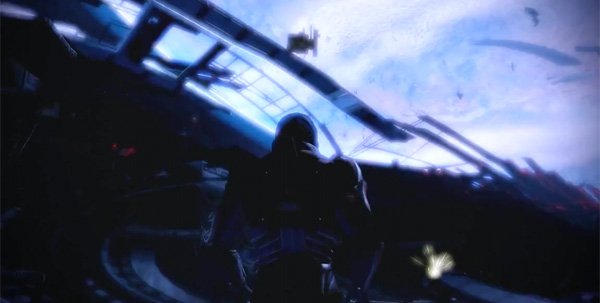
Why it's awesome: After the original game's lacklustre opening hour, Mass Effect 2 's introduction is like a glorious punch in the face. Action-packed, fast-paced and utterly extraordinary to look at, it's exactly what the opening to a good space epic should be like. The sequence ends on what would be a nice twist, as well - if the trailers hadn't spectacularly spoilt it for everyone.
Half-Life
What happens: You go to work. Shit gets real.
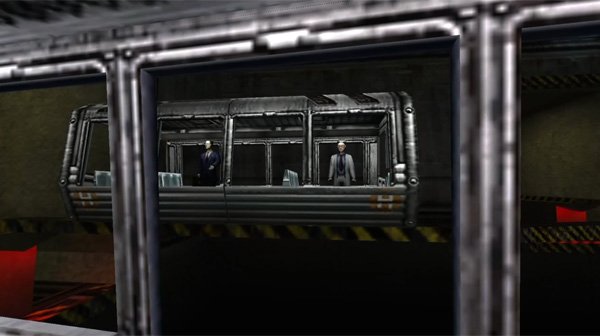
Why it's awesome: It was the first time an action game truly took scene-setting and storytelling seriously. By placing you in a world that was initially working as normal, and sending you on an uneventful train journey to your sector of the Black Mesa facility, Half-Life sucked you into its extraordinarily complex environment. Then, when you managed to blow the place up and cause an alien invasion, the effects of the disaster resonated far more than if you'd have been dropped straight into the shooty bits. 12 years later, it's still among the finest intros ever crafted.

